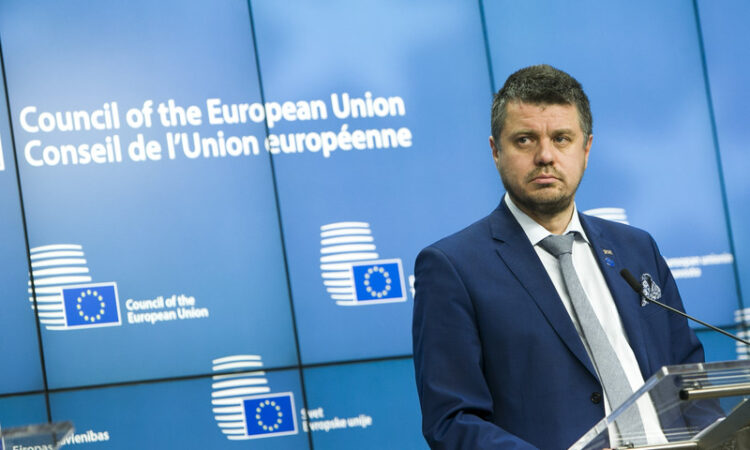
EU countries should consider a new round of Russian diplomatic expulsions, Estonia has said after ejecting 21 more Russians.
“In the context of Russia’s ongoing full-scale war on the soil of Europe against Ukraine, it’s worth considering also by other countries in the Western community,” Estonian foreign minister Urmas Reinsalu told EUobserver on Wednesday (11 January).
“It’s a solely individual and sovereign decision whether to do so,” he added.
But “it’s one way to protest Russian aggression and also has some practical benefits,” Reinsalu said, referring to the fact Russian diplomats in Europe were doing nothing to advance peace.
Those left in Tallinn were mainly dealing with consular affairs and using their social media to spread propaganda, he noted.
Reinsalu spoke after Estonia told 13 Russian diplomats and eight Russian embassy technical staff to go home by 1 February.
The move leaves eight Russian diplomats and 15 other staff in place — the same number Estonia has in Moscow — in what Reinsalu called the principle of “parity”.
Estonia’s decision came after EU capitals expelled more than 300 Russian diplomats accused of espionage in the wake of a Russian massacre of Ukrainian civilians in the town of Bucha in April last year.
Most EU countries still have far fewer diplomats in Moscow than vice versa despite this.
Taking the EU itself as an example, the EU foreign service has just nine diplomats in Russia, while Russia has some 35 people left at its EU embassy in Brussels even after the Bucha-linked expulsion of 19 staff.
And Russia’s chargé d’affaires in the EU capital, Kirill Logvinov, who heads up operations since the ambassador was recalled, is himself a spy according to Belgium’s domestic intelligence service.
It remains to be seen if anyone else follows Tallinn’s lead on “parity”.
“My question is, what good does it do beyond symbolism?”, a Dutch diplomat said.
“We do want to keep our eyes open and our ears to the ground in Russia, especially in these times,” he added, amid the likelihood Russia would expel even more EU diplomats in a new tit-for-tat exchange.
But little Estonia punches above its weight in EU foreign policy because its security services have one of the best and largest Russia counter-intelligence departments in Europe.
And the Czech Republic and Lithuania, which already apply the principle of parity to Russia, immediately endorsed Reinsalu’s idea.
“We support the decision of Estonian diplomacy,” Czech foreign minister Jan Lipavský told EUobserver.
“Given the common Schengen area and the threat Russia and its intelligence officers working under diplomatic cover pose, it [a second round of expulsions] is already long overdue,” he added, referring to Europe’s passport-free Schengen travel zone.
“It’s fair to apply the principle of parity in regards to Russian diplomatic representations across the EU,” a Lithuanian diplomat said.
Meanwhile, Estonia is also spearheading a campaign for EU countries to seize Russia’s frozen state assets and give them to Ukraine.
Tallinn has frozen just €20m but is already exploring legal ways to confiscate the money.
The EU has collectively frozen more than €300bn, most of it from Russia’s central bank, and the EU Commission is also looking at the legal niceties of confiscation, Reinsalu noted.
“We would welcome a pan-European solution,” he said.
“All the support Western countries have given Ukraine over the past year is far less than the [Russian] assets under our control, so it would be a game-changer,” he added.
International law should be reformed if need be in reaction to Russia’s “genocidal” war, he also said.
“The entity committing genocide is the Russian Federation, a state controlled by [Russian president Vladimir] Putin and his inner circle and in this context we should surely use all legitimate tools at our disposal to stop this war and help Ukraine to win,” Reinsalu said.
EU sanctions on Russia currently include a $60/barrell cap on the purchase price of Russian oil.
But this should be lowered when the cap-level comes up for an official review in the second half of January because market prices have fallen since it was introduced, Reinsalu added.
The sanctions also blacklist more than 1,500 Russian individuals and companies and ban trade in a laundry list of goods, ranging from high-tech items such as semi-conductors to wood pulp and paper.
“Have we done enough? We’re far from that,” Reinsalu said.
The next round of EU measures should cut all remaining Russian banks from the Swift international payments grid, forbid EU firms from giving any financial services to Russian clients, and ban imports of Russian raw materials, he said.





